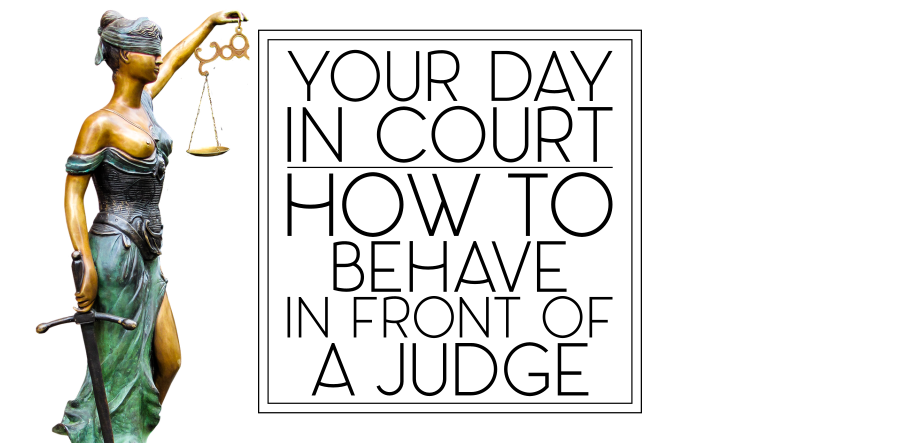So, you’re going to court (most likely a small claims court in your county). You’re going to have to sit in front of a real judge. How do you dress? What do you do? What can you say? How can you make sure that you won’t make some horrifying mistake and be held in contempt?
Take a deep breath. Now read this handy list.
Dress conservatively and professionally. No sandals. No jeans. No tank tops. No t-shirts. Dress like you’re going for an interview at a law firm or to a congressman’s funeral. This is not the time to make a fashion statement. Dressing sexy will win you no points here. If you chose to wear a skirt, make sure it’s no shorter than two inches above your knee.
Courts are weirdly formal places. Prepare yourself accordingly.
Keep your makeup minimal and natural. Don’t get crazy with that eye shadow. You want to be taken seriously, so don’t walk into the courtroom with you eyelids covered in rainbow glitter. Remember, you’re entering a place where people tend to care a whole lot about presentation and decorum. Some judges read a little too deeply into fashion choices and what they say about people.
Remove the metal from your face. If you normally wear facial piercings, take them out. They aren’t appropriate to wear to court. I cannot reiterate this enough times:
As stupid as it is, appearances matter. A lot.
Don’t wear a belt or complicated shoes. You will have to remove your shoes and walk through a metal detector before you can enter the courthouse. Make it easy on yourself by leaving your belts and metal accessories at home and wearing flats you can slip into and out of easily. Don’t create unnecessary stress. You’ll likely be a hot mess of nerves to begin with.
When it’s your turn to sit in front of the judge, follow these rules.
Don’t speak unless you’re spoken to. Never show emotion during your opponent’s testimony. You can be nervous, sad, and scared. You cannot be angry, loud, or disrespectful. Judges have zero patience or tolerance for belligerence.
Don’t roll your eyes, sigh, or draw attention to yourself.
Even if the other party lies through their teeth, keep your mouth shut and your attitude in check. Write down your objections and bring them up when it’s your turn to speak. Put on your best poker face and be patient.
Always address the judge with “Your Honor” or “Sir” or “Ma’am,” and never use slang or profanity. When you’re asked a question that requires a yes or no answer, always say “yes ma’am/sir/Your Honor” or “no ma’am/sir/Your Honor.” Never say, “yeah,” “nope,” or “I dunno.”
Don’t go in demanding justice. Do not bark orders at a judge or demand anything from them. Sure, your tax dollars pay their salary, but they don’t work for you.
You’re at court to reach a peaceful, reasonable resolution, not to fight with your opponent.
Both of you believe you’re right. You can’t come to an agreement, so you are in court to ask the judge to come up with a fair solution based on the information and evidence that each of you collected. Approach it from that perspective–it’s not about winning or losing but having a neutral party evaluate each of your positions and make a decision for you.
You can think that your opponent’s actions were wrong. You can feel your opponent’s action were wrong. You don’t know they were wrong or not. The judge determines that. (Even if you really do know and you have fistfuls of statutes and evidence to support that argument, never go in with the arrogance of assurance.)
In small claims court, don’t be afraid to tell the judge that you’ve never been in court before and you may have questions during the proceedings. Small claims courts are generally pretty mellow. Nobody has attorneys and judges don’t expect you to be competent in court procedure. If you don’t understand what a judge asks of you or what they mean, politely ask for an explanation.
Keep your testimony brief and only testify to what you can prove. This is so, SO important. Do not pop off with a bunch of irrelevant, unverifiable testimony. If you cannot prove a claim, the judge will likely disregard it.
Bring evidence in triplicate. One for you, one for the judge, and one for your opponent.
A lot of professionals panic at the thought of going to court. Don’t be scared. The majority of the time, you’re going to end up in small claims, where the stakes are low and the process is pretty informal. You don’t need an attorney, the rules are relaxed, and if you’re the plaintiff, generally, the worst that can happen is that your case gets dismissed and you lose your filing fee. No biggie. In other proceedings, you’ll have an attorney representing you and doing all the heavy lifting, so relax and focus on controlling the one thing you can control—yourself.
Have you ever been to court? What for? Were you scared? What happened? Tell us about it in the comments!








